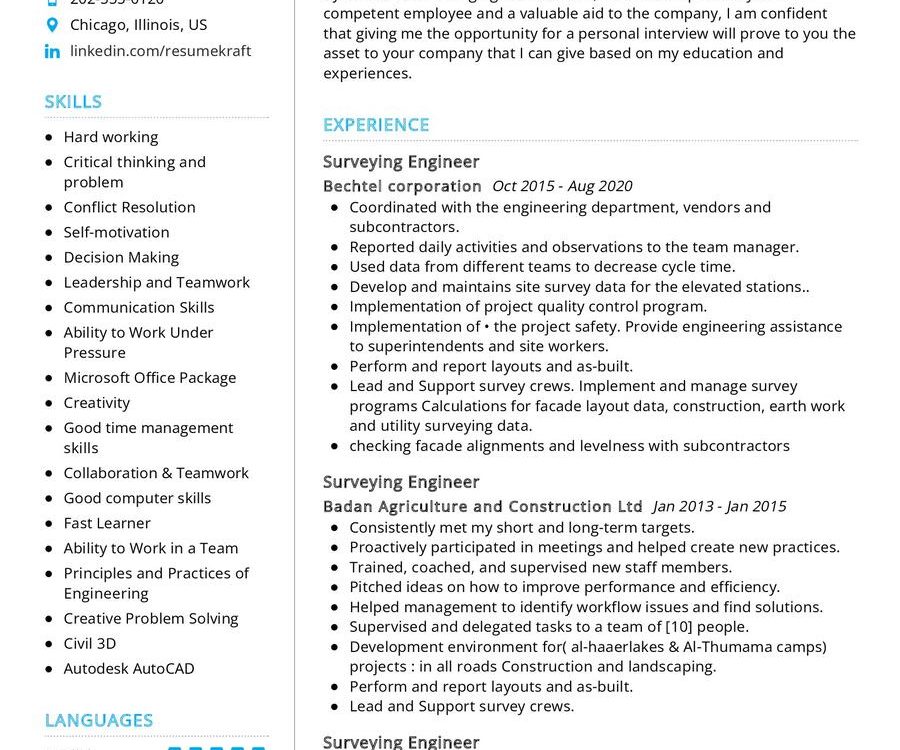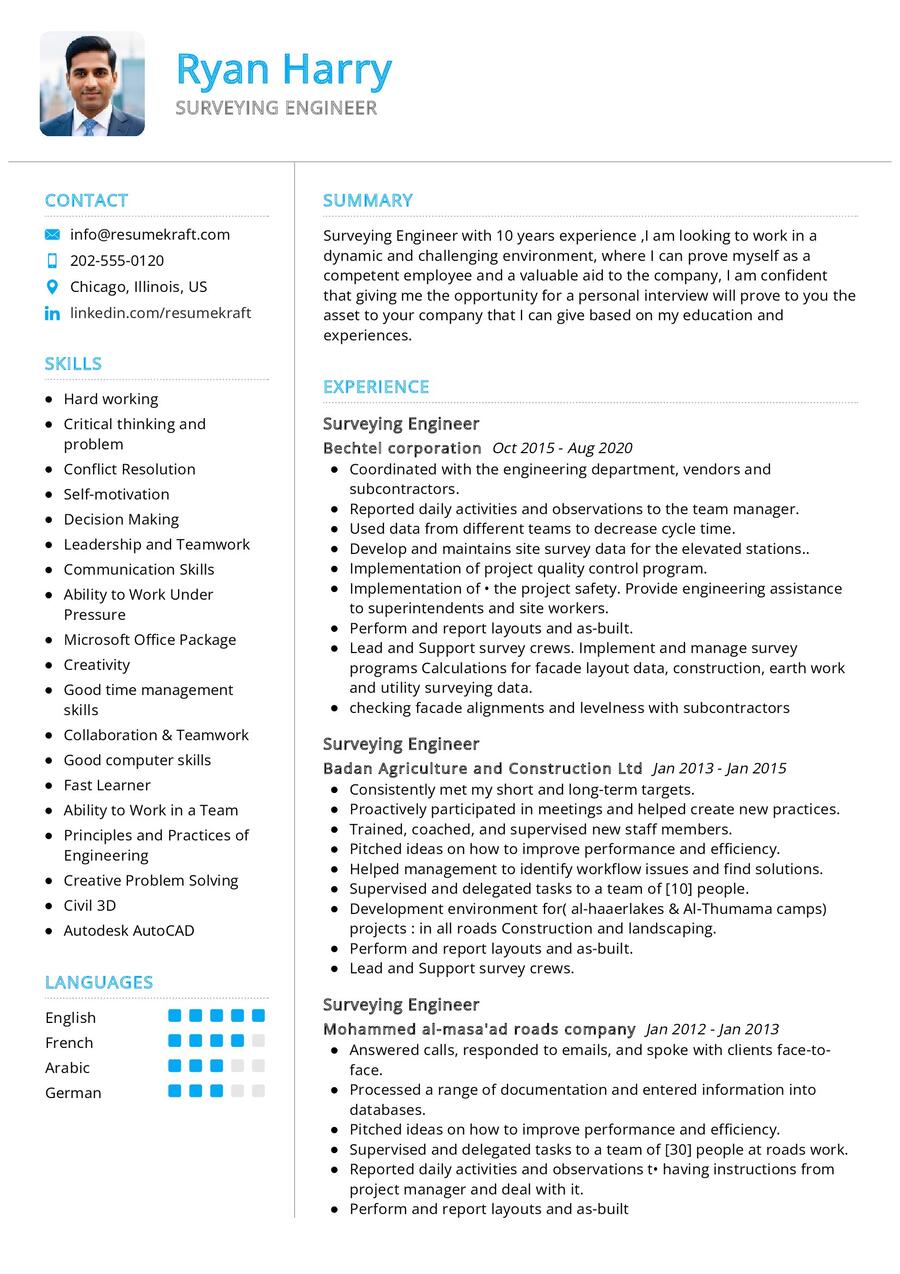Exploring the Role of a Surveying Engineer
In the ever-changing landscape of engineering, the role of a Surveying Engineer holds a crucial position. This unique blend of technical prowess and surveying expertise contributes significantly to project success. Let’s delve into the multifaceted responsibilities and requirements that define the role of a Surveying Engineer.
Key Responsibilities of a Surveying Engineer
Surveying Engineers play a pivotal role in the planning and execution of construction projects. Their responsibilities encompass a broad spectrum, ranging from precise measurements to project coordination. Here’s a closer look at the key responsibilities:
- Conducting accurate land surveys to gather essential data for construction projects.
- Utilizing advanced surveying equipment, such as Total Stations and GPS devices, to ensure precision in measurements.
- Preparing detailed survey reports and maps for project planning and development.
- Collaborating with architects, civil engineers, and construction teams to integrate survey data into project designs.
- Ensuring compliance with local regulations and standards in surveying practices.
- Managing surveying teams, providing guidance and supervision throughout the project lifecycle.
- Implementing quality control measures to guarantee the accuracy of survey data.
- Adopting emerging technologies in surveying, such as LiDAR, for more efficient and detailed data collection.
Surveying Engineer Job Requirements
Embarking on a career as a Surveying Engineer requires a combination of education, technical skills, and practical experience. Let’s break down the essential requirements for aspiring Surveying Engineers:
- A Bachelor’s or Master’s degree in Civil Engineering, Geomatics, or a related field, providing a solid foundation in surveying principles.
- Proficiency in using surveying instruments and software, showcasing hands-on experience with tools like AutoCAD and GIS.
- Strong analytical skills to interpret survey data accurately and make informed recommendations for project development.
- Excellent communication skills for effective collaboration with diverse project teams and stakeholders.
- Attention to detail and a methodical approach to surveying tasks to ensure precision and reliability.
- Leadership qualities honed through project management experience or relevant courses and certifications.
- Knowledge of relevant safety regulations and best practices in surveying.
- An understanding of environmental considerations in surveying, especially for projects with ecological impacts.
Obtaining additional certifications, such as a Professional Land Surveyor (PLS) license, can enhance your profile and competitiveness in the job market.
Crafting Your Surveying Engineer CV
Your CV is your professional narrative, showcasing your skills and experiences in the best light. Here are some tips to create a compelling Surveying Engineer CV:
- Emphasize your surveying expertise, detailing specific projects where your contributions were instrumental.
- Showcase your proficiency in using surveying tools and software, providing evidence of your technical skills.
- Quantify your achievements with metrics, such as the size of the surveyed area or the percentage improvement in data accuracy.
- Highlight your leadership roles in managing surveying teams or overseeing projects from inception to completion.
- Tailor your CV for each application, aligning your skills and experiences with the specific requirements of the job.
Your CV is your passport to exciting career opportunities, so invest time in crafting a document that truly reflects your capabilities as a Surveying Engineer.
Surveying Engineer CV Summary Examples
Your CV summary is the opening statement that sets the tone for your application. Craft a powerful summary that encapsulates your journey and the value you bring as a Surveying Engineer:
- “Dedicated Surveying Engineer with over 8 years of experience, adept at utilizing advanced surveying technology for precise data collection and analysis.”
- “Results-driven Surveying Engineer with a proven track record in managing large-scale surveying projects, ensuring accuracy and compliance with industry standards.”
- “Experienced Surveying Engineer specializing in environmental surveying, integrating sustainability principles into project planning for eco-conscious development.”
Your CV summary is your chance to make a lasting impression, so make it compelling and reflective of your unique strengths.
Building Your Surveying Engineer Work Experience Section
Your work experience section is the heart of your CV, providing a detailed account of your professional journey. Here are examples of how to articulate your experience as a Surveying Engineer:
- “Led a team of surveyors in a major infrastructure project, achieving a 15% improvement in surveying efficiency through the implementation of advanced technologies.”
- “Contributed to the successful completion of a residential development by providing accurate land survey data, enabling precise project planning and execution.”
- “Managed the surveying aspects of an environmental impact assessment project, ensuring compliance with environmental regulations and minimizing ecological impact.”
Each experience listed should highlight your contributions, challenges overcome, and the impact of your surveying expertise on project outcomes.
Education Section for Your Surveying Engineer CV
Your education section is a testament to your academic journey and expertise. Here’s how you can present your educational background:
- Master of Science in Geomatics Engineering, XYZ University, a comprehensive program emphasizing advanced surveying techniques, 2016.
- Bachelor of Science in Civil Engineering, ABC University, providing a strong foundation in engineering principles and surveying fundamentals, 2013.
- Professional Land Surveyor (PLS) License, demonstrating your commitment to excellence and meeting industry standards, 2018.
Your education serves as the backbone of your surveying knowledge, so ensure it is showcased prominently in your CV.
Key Skills for Your Surveying Engineer CV
Your skill set is your toolbox, containing the essential instruments that make you an effective Surveying Engineer. Let’s outline the key skills needed for success in this role:
Soft Skills:
- Leadership and team management, crucial for overseeing surveying teams and coordinating with project stakeholders.
- Effective communication, facilitating collaboration with diverse teams and conveying survey data insights clearly.
- Analytical thinking, vital for interpreting survey data accurately and making informed decisions.
- Attention to detail, ensuring precision in measurements and adherence to surveying standards.
- Adaptability, the ability to adjust to changing project requirements and evolving surveying technologies.
Hard Skills:
- Proficiency in surveying tools and software, including Total Stations, GPS devices, AutoCAD, and GIS.
- Knowledge of environmental surveying principles, especially for projects with ecological considerations.
- Project management, essential for overseeing surveying projects from planning to completion successfully.
- Understanding of safety regulations in surveying, ensuring a secure working environment.
- Continuous learning, staying updated on emerging surveying technologies and industry best practices.
Each skill is a tool in your arsenal, contributing to your effectiveness as a Surveying Engineer.
Common Mistakes to Avoid in Your Surveying Engineer CV
Crafting a CV requires attention to detail to ensure it effectively communicates your value. Here are common mistakes to avoid:
- Avoid using a generic CV; tailor it to the specific job application to highlight your suitability for the role.
- Instead of listing routine tasks, focus on your achievements in each role to demonstrate the impact of your contributions.
- Don’t underestimate the importance of a cover letter; use it to provide additional context and showcase your enthusiasm for the position.
- While technical proficiency is essential, ensure your CV is accessible to a broad audience by avoiding excessive jargon.
- Always proofread your CV to maintain a professional image and avoid errors that could hinder your application.
Avoiding these common pitfalls will help your Surveying Engineer CV stand out and make a positive impression on potential employers.
Key Takeaways for Your Surveying Engineer CV
As you craft your Surveying Engineer CV, keep these key points in mind:
- Highlight your surveying expertise and its impact on project success.
- Showcase your technical proficiency with surveying tools and software.
- Quantify your achievements with metrics to provide a clear picture of your contributions.
- Tailor your CV for each application to align with the specific requirements of the job.
Your CV is your professional story, and crafting it thoughtfully will open doors to exciting opportunities in the field of surveying engineering. Best of luck!
Finally, feel free to utilize resources like AI CV Builder, CV Design, CV Samples, CV Examples, CV Skills, CV Help, CV Synonyms, and Job Responsibilities to create a standout application and prepare for the Surveying Engineer job interview.


